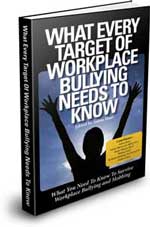 Employers are being encouraged by HR professionals and employer rights attorneys to weed out “troublemakers” before they get hired. They reason that hiring employees that are truly “qualified” and are “good fits” for the company will not become a problem. It is proper and necessary for businesses and organizations to conduct proper job interviews and meaningful background and reference checks of all job applicants. However, the question every career seeker and employee must ask is how do you define “troublemaker”, “qualified” and “good fits”??
Employers are being encouraged by HR professionals and employer rights attorneys to weed out “troublemakers” before they get hired. They reason that hiring employees that are truly “qualified” and are “good fits” for the company will not become a problem. It is proper and necessary for businesses and organizations to conduct proper job interviews and meaningful background and reference checks of all job applicants. However, the question every career seeker and employee must ask is how do you define “troublemaker”, “qualified” and “good fits”??
Now, obviously every one that applies for a job will NOT be a “good fit”, “qualified” and will be a true “troublemaker”. One consideration has to be the “qualifications” of the interviewer and the hiring manager in deciding who passes the grade. There is the issue of the culture of the workplace. Is it one that fosters and encourages employee trust through transparency and “good faith” intent? Is it a workplace that operates through fear, bullying, intimidation, harassment and “bad faith” intent?
If it’s the latter any job applicant that exhibits strength of character, strong work ethics, courage and willingness to pursue rights when necessary and possesses a conviction for equity of opportunity will be labeled a “troublemaker”. This individual will NOT be a “good fit” nor will he/she be “qualified”. The overwhelming majority of employers that have a culture modeled on the first workplace will experience far less lawsuits or threats of lawsuits. There will always be an element of job applicants that are true “troublemakers”, meaning poor work ethic, gossips, dishonest, drug addicted, violent and more.
However, the job applicant should be aware the perspective employer may be a “troublemaker” as well. The career seeker should perform a thorough “background, reference check and interview of the employer. Job applicants can do this in several ways;
- contact the Better Business Bureau
- contact the Labor Relations Board
- contact the human rights commission of your state
- contact the local media
- use your social media contacts
- contact the EEOC (Equal Employment Opportunity Commission)
- contact those working for the company
- contact friends and family
The job applicant can use these and other resources to investigate whether the employer will be a “troublemaker” by using the same standards the employer uses. If the company fails the “troublemaker” test the job applicant should avoid “hiring” that employer too.











